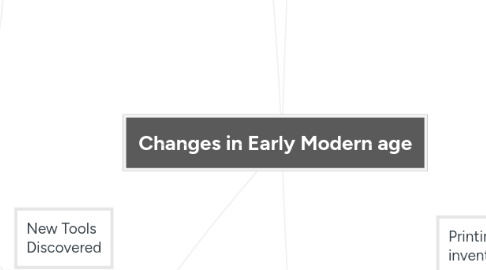
1. Science
1.1. New Tools Discovered
1.1.1. Telescopes and microscopes were discovered
1.1.1.1. Started to find out about diseases and how to cure them
1.1.1.2. Galileo Galilei created the water thermoscope which later then created the "Galileo" thermometer
1.1.2. Society had different reactions on different innovations
1.1.2.1. 16th and 17th century saw lots of new scientific discoveries
1.1.3. New discoveries in the 16th century to high increase in trade.
1.2. Astronomy
1.2.1. In the 16th Century a Polish Astronomer named Nicholas Copernicus theorized that the sun was the center of our solar system
1.2.1.1. In 1609 almost 60 years later Galileo Galilei proved that Nicholas Copernicus's theory wasn't just a theory and was instead a fact
1.2.1.1.1. In 1610 and once again in 1632 Galileo Published his findings but the Church's response was to silence and ban all of his writings in all Catholic Nations
1.3. Scientific Method
1.3.1. In the 17th Century an English Scientist and Philosopher Francis Bacon proposed a new method for scientific research
1.3.1.1. William Harvey in 1628 used the Scientific Method to discover how blood traveled through the body
1.3.1.1.1. William Harvey showed that blood only flows towards the heart not away from it
1.3.1.2. In the mid 17th century Isaac Newton used the scientific method to develop his laws of motion and gravitation
2. Church, Kings, and Nations
2.1. Divine Rights
2.1.1. Kings believed they were descendants of god
2.2. Revolution and the Church
2.2.1. Europe divided between religion
2.2.1.1. Catholics and protestant
2.3. Queen Elizabeth was a Queen and supreme head of the church of england
2.4. Until the 16th century all Christian Europeans were devoted to the Roman Catholic Church
2.4.1. The church became wealthy in the early 1500's
2.4.1.1. The church became corrupt and powerful, with this the church started to stray away from the teachings of Christ.
2.5. Before the Reformation the pope could control over kingdoms, But now kings could make themselves the supreme authority in their kingdoms
2.5.1. Kings of newly protestant lands could free themselves of the authority of their kingdoms
2.6. The Reformation
2.6.1. A German monk, Martin Luther posted "Ninety-Five theses" on the door of the All Saints Church on the 31st of October 1517
2.6.1.1. Luther, unhappy with the failings of his church decided to take action and make changes.
2.6.1.1.1. Thanks to the printing press his ideas spread across Europe rapidly. With thus the Protestant Reformation was born.
2.6.1.1.2. With the new ideas, Protestants emphasized the importance of the bible and wanted to read it in their language
3. Agriculture and Trade
3.1. In the 16th Century there was an introduction to new crops
3.1.1. Corn, Potatoes, Tomatoes, Squash, Beans, and Tobacco
3.1.2. Aside from introduction the late 16th century was introduced to more efficient farming
3.1.2.1. New farming tools were the big help for farmers and became less work and helped them make more money
3.1.3. Rice was a main resource coming from Southeast Asia
3.2. Before the Black death farmers grew crops on strips of land
3.2.1. After the Black death most of the small strips became larger farms used to grow one type of crop
3.3. Europeans began to seek out new routes to Southeast Asia
3.3.1. Southeast Asia was the source for luxury items such as silks and spices
3.3.2. Europeans instead found what is now known as South and North America
3.3.2.1. Wars between England and France would effect both Europe and North America
4. People, Art, and Literature
4.1. Printing Press invented in 1450
4.1.1. Books are more accessible
4.1.1.1. 15 million books were printed from 1450-1500
4.1.1.2. Knowledge was traded
4.1.1.3. New ideas led developments in all fields of study including science
4.1.2. School and libraries open up
4.1.2.1. Lots of people learnt how to read and write
4.1.3. Created for the purpose to enable mass production of books and dissemination of knowledge.
4.2. During the Renaissance. People became interested in the world around them.
4.2.1. Interests in playwrights and entertainment skyrocketed
4.3. Life expectancy was 22 years old
4.3.1. Many men had 2 or 3 marriages since the risk of death during child birth was raised.
4.4. Johannes Gutenburg is known to be the first European to use movable printing around the 14th century.
4.4.1. Then Nicolaus Copernicus wrote a book which opened up modern astronomy and brung up the Scientific Revolution

